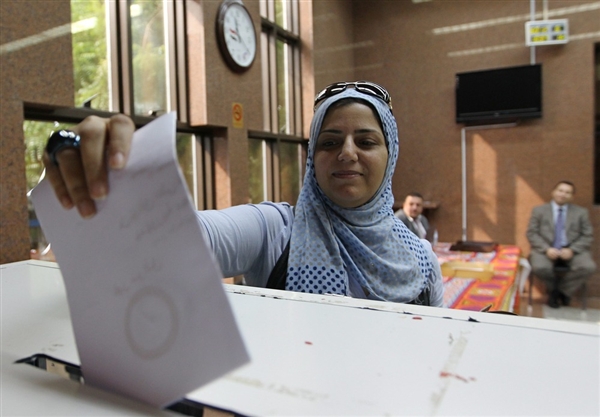
Despite a growing polarization between Morsi’s supporters and the opposition as a result of controversy surrounding the draft constitution, Egyptian expats have already completed their vote, and results have begun to emerge.
The expat referendum vote, originally scheduled to begin on Saturday December 8th, was postponed as a result of violent clashes that broke out on when pro-Morsi supporters attacked a demonstration by opposition protestors at the Presidential palace. Polling stations abroad opened instead on Wednesday December 12th, with voting ending on Monday December 17th.
Approximately 8 million Egyptians live abroad according to the Egyptian foreign ministry, and of them only 586,000 are eligible to vote. State-run news service MENA reported that over 200,000 expats voted in the referendum, a 28% decrease from voter participation during the presidential elections, and an overall voter turnout of 34%, similar to that seen in Egypt.
Voters living abroad who did not register during last year’s presidential elections did not have the chance to vote in the referendum, with registration no longer open to them. The decision not to open up registration was met with a backlash that did little to dissuade the government from pressing forward with the referendum as planned.
With the counting complete in 21 embassies and consulates, an expat voting pattern has begun to emerge. The majority of voters living in the Gulf voted in favour of constitution, while most of those living in the US, Europe and North Africa rejected it.
26 year-old Egyptian citizen Ahmed, who cast his vote in Doha, says that he sensed that the majority of voters were voting ‘yes’ for the proposed constitutional draft. A lot of the male voters shouted “Allahu Akbar,” (God is great) as they entered the Egyptian embassy in Doha, leading him to believe they were Islamists, and most likely Morsi supporters.
The voting area was well-staffed he said, many of the personnel were wearing name-tags, and a few men with long beards, something that has come to symbolize one’s Islamism, were also present in the voting area. Ahmed, however, cast a ‘no’ vote against the constitutional draft because he was unhappy with many of its articles.
25 year-old Nadine lives in Montreal, but was unable to vote because she had not registered during the presidential elections. Embassy personnel told her to wait for the next registration period, due to be scheduled with the upcoming parliamentary elections. “I should be able to vote anywhere with my Egyptian national ID,” Nadine said.
Someone who managed to vote in Montreal is 33 year-old Yasmine who had a smooth experience, taking all of 5 minutes to cast her vote. “There were 3 of the consulate staff taking in votes,” she said, “I know their faces because I’ve dealt with them before, for paperwork processing, as well as having seen them during previous elections.” Yasmine voted ‘no’ she said, “For all the obvious reasons; I don’t like much of the content [of the constitutional draft], but most importantly the circumstances under which it was written and finalized.”
While many voter experiences in most of the embassies and consulates seemed positive, many Egyptian citizens in Dubai reported that their names and ID numbers were not checked off a list, or even written down by embassy personnel, and that it would have been quite easy to return and vote multiple times. In Paris, some early morning voters were surprised to find their names already been crossed off the voting list as having cast their vote. As a result, they formed a blockade preventing the voting from continuing, claiming the process has been tampered with.
This was not the case across the board. 35 year-old Waleed, living in London, described his voting experience as “smooth,” adding that his name and Egyptian national ID number were both written down by embassy personnel as well as checked off a list in his presence.
Before voting began, approximately 200 diplomats issued a joint statement saying they will not supervise the referendum in protest over the violence against opposition protestors at the presidential palace. Diplomatic officials also expressed distress at what they alleged were instructions given to them by the foreign ministry to defend and promote Morsi’s constitutional declarations. Their anger at the alleged political directive was also expressed in a joint statement.
While accusations of rigging have been denied by the Foreign Ministry, much of the discourse among Egyptian expats revolves around a sense of distrust regarding the voting system. Many have expressed misgivings about the legitimacy of the referendum outcome, claiming certainty of voter tampering in favor of the constitutional draft.
The reason behind the low expat voter turnout remains unclear, as does Ministry of Foreign Affair’s reason behind refusing to open up voter registration. What is evident, however, is the need for a modernized electronic voting system that will allow for higher expat voter participation. This in turn would help restore a sense of trust in the system, making it far more difficult for votes abroad to be tampered with, particularly in the absence of judicial supervision.
Photo: EPA
Image: Egypt%20Expat%20Vote%20%20Dubai%20EP.jpg
